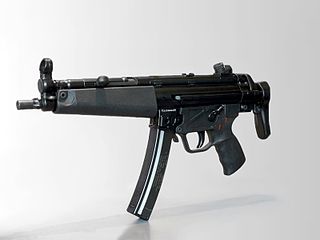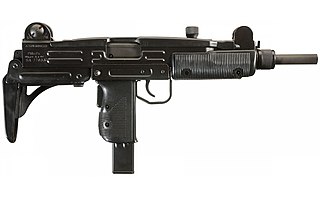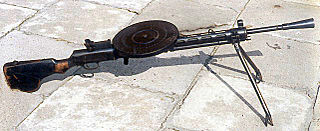The Small Arms Working Group (SAWG) is an alliance of US-based non-governmental groups which promote change of national and international policies on small arms. Members agree that small arms proliferation must be countered by responsible legal domestic sales and foreign cooperation in reducing illicit arms trafficking. Participation is open to any organization that supports its objectives.

The AK-47, officially known as the Avtomat Kalashnikova, is a gas-operated assault rifle that is chambered for the 7.62×39mm cartridge. Developed in the Soviet Union by Russian small-arms designer Mikhail Kalashnikov, it is the originating firearm of the Kalashnikov family of rifles. After more than seven decades since its creation, the AK-47 model and its variants remain one of the most popular and widely used firearms in the world.

The Birmingham Small Arms Company Limited (BSA) was a major British industrial combine, a group of businesses manufacturing military and sporting firearms; bicycles; motorcycles; cars; buses and bodies; steel; iron castings; hand, power, and machine tools; coal cleaning and handling plants; sintered metals; and hard chrome process.

The Heckler & Koch MP5 is a submachine gun developed in the 1960s by German firearms manufacturer Heckler & Koch. It uses a similar modular design to the Heckler & Koch G3, and has over 100 variants and clones, including selective fire, semi-automatic, suppressed, compact, and even marksman variants. The MP5 is one of the most widely used submachine guns in the world, having been adopted by over forty nations and numerous militaries, police forces, intelligence agencies, security organizations, paramilitaries, and non-state actors.

The Uzi is a family of Israeli open-bolt, blowback-operated submachine guns and machine pistols first designed by Major Uziel "Uzi" Gal in the late 1940s, shortly after the establishment of the State of Israel. It is one of the first weapons to incorporate a telescoping bolt design, which allows the magazine to be housed in the pistol grip for a shorter weapon.

A brigade is a major tactical military formation that typically comprises three to six battalions plus supporting elements. It is roughly equivalent to an enlarged or reinforced regiment. Two or more brigades may constitute a division.

An arsenal is a place where arms and ammunition are made, maintained and repaired, stored, or issued, in any combination, whether privately or publicly owned. Arsenal and armoury or armory are mostly regarded as synonyms, although subtle differences in usage exist.

The Steyr AUG is an Austrian bullpup assault rifle chambered for the 5.56×45mm NATO intermediate cartridge, designed in the 1960s by Steyr-Daimler-Puch, and now manufactured by Steyr Arms GmbH & Co KG.

Fabrique Nationale Herstal, trading as FN Herstal and often referred to as Fabrique Nationale, Factory National, or simply FN, is a leading firearms manufacturer based in Herstal, Belgium, and former vehicle manufacturer. It was the largest exporter of military small arms in Europe as of 2012.
The small arms trade is the markets of both authorized and illicit small arms and light weapons (SALW), as well as their parts, accessories, and ammunition.

The Heckler & Koch G3 is a select-fire battle rifle chambered in 7.62×51mm NATO developed in the 1950s by the German firearms manufacturer Heckler & Koch, in collaboration with the Spanish state-owned firearms manufacturer CETME. The G3 was the service rifle of the German Bundeswehr until it was replaced by the Heckler & Koch G36 in the 1990s, and was adopted into service with numerous other countries.

The arms industry, also known as the defence industry, military industry, or the arms trade, is a global industry which manufactures and sells weapons and military technology. Public sector and private sector firms conduct research and development, engineering, production, and servicing of military material, equipment, and facilities. Customers are the armed forces of states, and civilians. An arsenal is a place where arms and ammunition – whether privately or publicly owned – are made, maintained and repaired, stored, or issued, in any combination. Products of the arms industry include weapons, munitions, weapons platforms, military communications and other electronics, and more. The arms industry also provides other logistical and operational support.

The Degtyaryov machine gun or DP-27/DP-28 is a light machine gun firing the 7.62×54mmR cartridge that was primarily used by the Soviet Union, with service trials starting in 1927, followed by general deployment in 1928.

The TT-30, commonly known simply as the Tokarev, is a Soviet semi-automatic pistol. It was developed during the late 1920s by Fedor Tokarev as a service pistol for the Soviet Armed Forces and was based on the earlier pistol designs of John Moses Browning, albeit with a number of detail modifications to simplify production and maintenance. The Soviet Union ceased production of the TT in 1954, although derivatives of the pistol continued to be manufactured for many years in the People's Republic of China and a number of nations aligned with the Soviet bloc.

The DShK 1938 is a Soviet heavy machine gun. The weapon may be vehicle mounted or used on a tripod or wheeled carriage as a heavy infantry machine gun. The DShK's name is derived from its original designer, Vasily Degtyaryov, and Georgi Shpagin, who later improved the cartridge feed mechanism. It is sometimes nicknamed Dushka in Russian-speaking countries, from the abbreviation.

Small arms and light weapons (SALW) refers in arms control protocols to two main classes of man-portable weapons.

NGC 4622 is a face-on unbarred spiral galaxy with a very prominent ring structure located in the constellation Centaurus. The galaxy is a member of the Centaurus Cluster.

The RPD is a 7.62x39mm light machine gun developed in the Soviet Union by Vasily Degtyaryov for the 7.62×39mm M43 intermediate cartridge. It was created as a replacement for the DP machine gun chambered for the 7.62×54mmR round. It is a precursor of most squad automatic weapons. It was succeeded in Soviet service by the RPK.

The AKM is an assault rifle designed by Soviet small arms designer Mikhail Kalashnikov in 1959. It was developed as the successor to the AK-47 adopted by the Soviet Union a decade prior.

An assault rifle is a select fire rifle that uses an intermediate-rifle cartridge and a detachable magazine. Assault rifles were first put into mass production and accepted into widespread service during World War II. The first assault rifle to see major usage was the German StG 44, a development of the earlier Mkb 42. While immediately after World War II, NATO countries were equipped with battle rifles, the development of the M16 rifle during the Vietnam War prompted the adoption of assault rifles by the rest of NATO. By the end of the 20th century, assault rifles had become the standard weapon in most of the world's armies, replacing full-powered rifles and submachine guns in most roles. The two most successful modern assault rifles are the AK-47 and the M16 designs and their derivatives.
The Small Arms Survey (SAS) is an independent research project located at the Graduate Institute of International and Development Studies in Geneva, Switzerland. It provides information on all aspects of small arms and armed violence, as a resource for governments, policy-makers, researchers, and activists, as well as research on small arms issues.